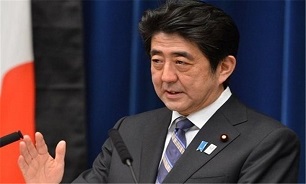Abe Seen Reaching Out to North Korea Ahead of Key Election
 In a recent interview with the Japanese daily Sankei Shimbun, Abe voiced his desire to meet North Korean leader Kim Jong-un "unconditionally" for frank talks and to tackle the issue of Japanese nationals abducted by Pyongyang decades ago.
In a recent interview with the Japanese daily Sankei Shimbun, Abe voiced his desire to meet North Korean leader Kim Jong-un "unconditionally" for frank talks and to tackle the issue of Japanese nationals abducted by Pyongyang decades ago.
Abe has been girding for upper house elections slated for July, amid expectation that he may strive for foreign policy coups in the wake of his ruling Liberal Democratic Party's defeat last month in two key by-elections seen as a major test of public sentiment.
"We can't break the shell of mutual distrust between Japan and North Korea unless I directly face Mr. Kim," he told the newspaper. "I hope that he is a leader who can make a decision strategically and flexibly on what is best for his nation."
Japan has recently held out olive branches to the North through such measures as desisting from submitting to the United Nations an annual joint resolution condemning Pyongyang's human rights violations.
Abe, a foreign policy hawk, has appeared to have put out the diplomatic feelers to Pyongyang in apparent hopes of addressing the abduction issue to appeal to his voters and carving out a presence in ongoing efforts for a nuclear-free Korean Peninsula.
Bolstering electoral chances is crucial for Abe's long-standing push for the constitutional revision aimed at expanding his country's security role, which requires at least a two-thirds majority in the upper house of the Diet.
"Abe's move vis-a-vis the North may not be unrelated to the summer elections given that the constitutional change is his lifelong task amid growing opposition to that agenda," Nam Chang-hee, professor of international politics at Inha University, said, Yonhap news agency reported.
Abe's outreach has also spawned speculation that Tokyo might seek to court the impoverished state in a show of its diplomatic clout amid tensions with Seoul at a time when inter-Korean reconciliation is feared to be losing steam due to a lack of progress in denuclearization negotiations between Pyongyang and Washington.
The relations between the South and Japan have chilled in recent months amid tensions over Japan's wartime forced labor and a military spat caused by Tokyo's claim that a South Korean warship locked fire-control radar on its patrol aircraft in December.
Tokyo's move to engage with Pyongyang also appears to have been affected by a growing wariness over the possibility of Japan being marginalized in the shifting contours of geopolitics on the peninsula.
Japan has been seen as left out in the cold or out of the loop while Seoul and Washington have been beefing up cooperation for the shared goal of Pyongyang's denuclearization despite intermittent rumors of discord between the allies.
Analysts said that Tokyo may want to keep abreast of developments on the peninsula as it wants to ensure that its interests are not harmed in the ongoing peace process that could lead to a weakening of US security commitments to the region under a diplomatic arrangement between Washington and Pyongyang.
For Japan, the North armed with nuclear warheads and operational intermediate-range ballistic missiles still remains an abiding source of security threats.
During his speech at the UN General Assembly last September, Abe said he was open to a summit with Kim to help address the mutual distrust dating back to Japan's 1910-45 colonization and to "get off to a new start," though he underscored that their meeting, if realized, must contribute to resolving the abduction issue.
Pyongyang is thought to have kidnapped many Japanese people to train its agents for espionage operations during the 1970s and 80s.
After Japanese prime minister Junichiro Koizumi visited Pyongyang for a summit with North Korean leader Kim Jong-il in 2002, the North admitted that it had kidnapped 13 Japanese, returning five of them while claiming the remaining eight had passed away.
As to Tokyo's conciliatory gesture, Pyongyang has yet to make any response.
But speculation is growing that the North Korean leader might seek to meet Abe in his own diplomatic drive toward key regional players, including the United States, China, Russia and South Korea, as part of a push to ease international sanctions and advance his economic agenda.
Tokyo appears well positioned to provide financial support to Pyongyang in the form of making reparations to its former colony in exchange for normalizing diplomatic relations at a time when Washington appears reluctant to "reward Pyongyang's bad behavior."
Amid fears that Japan's influence over the North could overshadow the South's diplomatic presence, Seoul appears to be seeking to mend fences with Tokyo first through a pledge for a "future-oriented partnership."
"It has to build a good relationship with Japan for security, economy and future development," President Moon Jae-in said during a luncheon meeting with senior leaders of Korean society on Thursday.
The president, however, voiced concerns that Japan has a tendency to politicize and amplify the bilateral issues stemming from the "unfortunate" history between the two countries.
His remarks followed Foreign Minister Kang Kyung-wha's statement about Seoul's "clear will" to improve relations with Japan.
"With regard to Japan that ushered in a new era with the enthronement of Emperor Naruhito yesterday, (South Korea) will continue to push for the development of a future-oriented relationship while squarely facing history," Kang said.
Message end/
